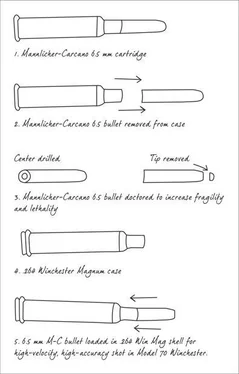Stephen Hunter - The Third Bullet
Здесь есть возможность читать онлайн «Stephen Hunter - The Third Bullet» весь текст электронной книги совершенно бесплатно (целиком полную версию без сокращений). В некоторых случаях можно слушать аудио, скачать через торрент в формате fb2 и присутствует краткое содержание. Жанр: Триллер, на английском языке. Описание произведения, (предисловие) а так же отзывы посетителей доступны на портале библиотеки ЛибКат.
- Название:The Third Bullet
- Автор:
- Жанр:
- Год:неизвестен
- ISBN:нет данных
- Рейтинг книги:5 / 5. Голосов: 1
-
Избранное:Добавить в избранное
- Отзывы:
-
Ваша оценка:
- 100
- 1
- 2
- 3
- 4
- 5
The Third Bullet: краткое содержание, описание и аннотация
Предлагаем к чтению аннотацию, описание, краткое содержание или предисловие (зависит от того, что написал сам автор книги «The Third Bullet»). Если вы не нашли необходимую информацию о книге — напишите в комментариях, мы постараемся отыскать её.
The Third Bullet — читать онлайн бесплатно полную книгу (весь текст) целиком
Ниже представлен текст книги, разбитый по страницам. Система сохранения места последней прочитанной страницы, позволяет с удобством читать онлайн бесплатно книгу «The Third Bullet», без необходимости каждый раз заново искать на чём Вы остановились. Поставьте закладку, и сможете в любой момент перейти на страницу, на которой закончили чтение.
Интервал:
Закладка:
Then, as we watched, it transformed instantly into panic, buzz, dread, gibbering, stupidity. People couldn’t shut up. An insistent yammer began, a mutter with high notes, inflections, voices piping or breaking or losing steam in a flood of phlegm. The lobby was not crowded, but everyone began yapping at each other, along the lines of “He was shot?”
“In the head?”
“Oh my God, is he dead?”
“Who the hell could have done it?”
“Was it the Russians? Did the Commies get JFK?”
“Where did the shots come from?”
“The Book Depository? Are you kidding? The Book Depository! ”
“Who would do such a terrible thing?”
Nobody paid the two of us any attention, and I pushed Lon to the door, rotated 180 degrees to back out and pull him through, got that done, and emerged into sunlight, heat, panic, incredible motion, pandemonium everywhere, random, brain-dead movement, and people talking insanely among themselves.
I saw only one man moving with purpose, a Dallas policeman who raced to the building, almost knocking me down getting by, and bulled his way inside. He was quick, that man, and I don’t know if it was by official directive or his own decision, but he’d understood that if the Book Depository was the probable origin point for the shooting, other buildings with access to Elm Street should be sealed for investigation.
He’d missed us, or perhaps scanned us from afar and dismissed us because of Lon’s disability. As for Jimmy, still inside, I felt confident that he could outthink and outmaneuver a Dallas policeman any day of his life.
I gingerly pushed Lon to the edge of the steps and began the ordeal of easing him down into the roiling crowd, which, drawn to tragedy exactly as had been the thousands who’d lined up to see the bullet-riddled corpses of Bonnie and Clyde, surged toward the plaza to see, to know, to feel, to bear witness, to be a part of what all felt was a calamitous day for our country.
I was trying to figure which way to go, as fighting the crowd with Lon wouldn’t be easy. I’d pretty much decided to get across Elm, divert to Houston, hit Main, and head up until the crowds had thinned, then cut to Commerce to get us back to the hotel.
Then the left wheelchair tire caught on something on the middle step. I bent awkwardly to see what it was (a chunk of loosened cement that had worked out of the joinery between the stone slabs) and was readjusting the chair by pulling it back a couple of inches when, in my peripheral vision, I saw Alek.
I happened to be tilted away from him; I was looking down and hunched and twisted to jigger the chair free, and perhaps that is why he didn’t see me. Was that luck? I suppose. The other truth is, he probably wouldn’t have recognized me under the cowboy hat I wore and under the pall of doom he wore.
He was the betrayed man. For an instant, but only an instant, I felt a mote of sympathy for him. He’d been looking through the scope, trying to get on target for his third shot, when he’d seen what only Lon had seen – though within months, thanks to Mr. Zapruder, the world would see it. Alek, with his low, weaselly cunning, would know in that instant he was tricked and abandoned. Stupendous fury must have overcome him, replaced in seconds with abject, sickening panic. Along with thoughts along the line of: Fucked again, failed again, now I’m really cooked. Or maybe there’d been a twinge of ego gratification in what had to be his impending destruction: at last he was important enough to betray. His paranoid fantasy had at last come true. He was that crazy. Somehow he’d gotten downstairs and out of the building before it was sealed. Now he had no place to go, he had no escape plan, he knew the Wagoneer wouldn’t be waiting at Houston and Pacific, that it wouldn’t be long before a canvass was taken at the depository and his absence was discovered, a few minutes beyond that when his FBI record was connected to his name. He knew he was about to become the most hunted man on earth.
He already looked it. He knew he was the patsy. He was grim, hunched, angry, churning ahead with menace and dread in his beady eyes. His skin was ashen, his hair was all messed up, his cheeks were hollow, his jowls set hard, as if he were grinding his teeth. Though muscular, he had his hands jammed into his pockets, which narrowed his shoulders and gave him an almost negligible slenderness. He was the quintessential man of the fringes, aware that the bright glare of the world’s attention was to be focused on him. No trained clandestine operative would have presented such an obvious profile to the world, but nobody else was paying much attention either. He fought against the human current that gushed toward Dealey and the scraps and fragments of hope that filled the air. I heard them too.
“Maybe he’s okay. Head wounds bleed a lot.”
“They got him to the hospital in minutes, maybe seconds. These days, docs can do anything.”
“Maybe it was a grazing wound, you know, splashed some blood but didn’t do any real harm. That happened more’n you’d think in the war.”
“A guy that vigorous, he’ll be up and about and playing touch football in a few days!”
Impervious, head down, clothes ever grubby and attitude ever surly, Alek bucked ahead, ducking, stutter-stepping, evading, and soon I lost sight of him. His destiny lay elsewhere.
I got Lon all the way down to the sidewalk and joined the human tide. Everywhere I looked, small scenes of grief played out: a Negro woman had collapsed and was shrieking violently, there seemed to be cops everywhere, children cried, women wept, the men had that grave, glaring war face that I’d seen and would see again in Vietnam. The pedestrian masses overspilled the streets, and traffic was at a standstill. We could see more and more police cars converging on the scene, though trapped in the amber of people and vehicles, going nowhere. Guns had come out, and I think federal agents had arrived with their tommy guns, or maybe it was Dallas Homicide with all the firepower. I don’t know who they thought they were going to fight; maybe some red sniper nest defended by machine guns on the sixth floor of the Book Depository.
That was the focus of the attention. It was surrounded by policemen and cars and earnest federal agents who’d taken out their badges and pinned them on the lapels of their dark suits. Many had pistols out too. At the same time, the television trucks – remember, TV news was in its infancy then, and the camera equipment was cumbersome – had somehow bulled their way through, gotten their cameras out, and set up shots. I could see, every which way, earnest reporters addressing the tripod-mounted eyes of the networks and the locals. (I think Dan Rather was there somewhere.) Farther down the hill, I could see armed officers on the grassy knoll that would become such a feature, and all across the green emptiness of Dealey, small groups of people stood, many pointing, first at the looming Book Depository, then at the grassy knoll. Nobody pointed at Dal-Tex.
And the noise. I can’t quite describe it, but it was as if, involuntarily, every one of the thousands of folks there had started to moan or snort or breathe too heavily. A persistent murmur filled the air, not the surge of joy I’d heard from Dal-Tex 712 but something guttural and low, animalistic. No one person contributed that much, but it was the voice of the collective unconscious expressing its horror and grief and regret. I’d never heard before and would never again hear anything like that.
I got Lon across Elm and we began to push our way up Houston toward Main. People stormed by us, late to the party but intent on joining. Nobody gave a damn about us except for one cop at the corner of Main and Elm, who noted me waiting for the solid stream of traffic to break to get across, and when I was about to give up and go up Main, he took command of the traffic, whistle and attitude at full blast, and cleared a space for us to get across. I nodded thanks to him, and he nodded back; that was my only encounter with law enforcement that day, and I’ll bet in ten seconds the officer had forgotten all about it.
Читать дальшеИнтервал:
Закладка:
Похожие книги на «The Third Bullet»
Представляем Вашему вниманию похожие книги на «The Third Bullet» списком для выбора. Мы отобрали схожую по названию и смыслу литературу в надежде предоставить читателям больше вариантов отыскать новые, интересные, ещё непрочитанные произведения.
Обсуждение, отзывы о книге «The Third Bullet» и просто собственные мнения читателей. Оставьте ваши комментарии, напишите, что Вы думаете о произведении, его смысле или главных героях. Укажите что конкретно понравилось, а что нет, и почему Вы так считаете.












